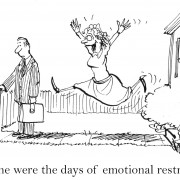What Gets Talked About In Sex Therapy?
We Have Mis-Matched Sexual Desires
The most commonly reported problem in sex therapy is called ‘desire discrepancy’: one partner wants sex more often than the other and in a more erotic way. In the beginning of a relationship, the higher desire partner probably kept the erotic energy going in the marriage and it was fun and sexy. After a while, if you’re the lower sex-drive partner, it can feel annoying and even manipulative to have a partner who is constantly looking for sex when you aren’t. Sometimes it’s just because the sex isn’t that great; working on discovering the kind of sex both partners want can improve the performance and eroticism of their sex life. Or it could be that there’s tension and frustration in the relationship and it’s leaking over into the erotic part of the relationship. If that’s the case, it’s a hard climb over that kind of resentment in bed. But talking about what’s bothering you can actually bring you closer and make you more inclined to want to make love.
I Can’t Orgasm The “REAL WAY”
Women sometimes tell me they wish they could climax the ‘real’ way — through intercourse. The clitoris, however, not the vagina is the centre of sexual and pleasure nerve endings. In fact, only about 15-20 percent of all women can climax during sexual intercourse and even then they require lots of vibration, manual or oral stimulation to get them close. For those who still want to try likely positions, I recommend two with good G-spot-penile contact: Either woman-on-top at a 45 degree angle or woman-lying-on-her back on a relatively firm surface with her hips rocked up (for instance, with her knees hooked around his elbows).
Performance Issues
When a man is in a relationship, the most common performance problems are premature ejaculation (PE) and erectile dysfunction (ED). In both instances, the men end up with strongperformance anxiety which can cause them to avoid sex and intimacy. Women whose partners are dealing with ED may feel insecure that their partners are no longer attracted to or desirous of them. To move beyond performance anxiety, men need to focus on their own bodies and pleasure and worry a little less about their partners. Learning to focus on pleasure, relaxing your body and your breath and letting yourself enjoy the experience help tremendously. If you are his partner, it’s essential not to take it personally and to be gentle with him. Supportive partners who do not require that their partners function perfectly all the time have the best chance of resolving these issues.
I Want To Spice Up Our Sex Life But My Partner Isn’t Interested
People frequently tell me they want more variety in the bedroom. As time goes on, partners may express more desire for novelty or feel more comfortable letting their partner know they have certain activities they want to explore. While one partner might enjoy getting a few slaps on the behind or experimenting with anal play, the other may not want to try. A sex therapist’s responsibility is to assess and possibly promote openness to change and reveal the underlying tensions that the couple may not be discussing initially.
Before Baby Sex
Couples seek sex therapy soon after having babies, sometimes because the woman feels too loose and says she can’t feel him inside her. Kegel exercises with twenty reps three times a day can improve the muscles in the pelvic floor. If she wants quicker results, there are medical devices such as the Apex which inflates to fit and does your Kegel exercises for you through gentle electric stimulation. Of course there is more to satisfying sex than just intercourse, such as mutual masturbation, oral sex and incorporating sex toys into their sexual pleasure
I Have A Lower Sex Drive Than My Wife
I frequently see couples where the man is confused about why he doesn’t want to have sex and the woman is the frustrated one. Without a clear answer, I end up asking a ton of questions trying to decipher why. If it’s because he feels too dependent or too close to his partner, distancing is the goal. Most commonly, men complain to me about not getting the loving contact they want. He may feel she goes through the motions, treats sex like a chore, or just lies there when he wants more love, contact, emotion and presence. Women sometimes make the mistake of thinking their partners are just trying to satisfy a biological need and treat sex in a perfunctory manner, to ‘please’ the guy. But this shuts men down; they want more passion than that. I remind couples that passion requires engagement, expression, eye contact and trying to really feel. It’s more than touch.
I Have A Lower Sex Drive Than My Husband
Many women tell us that they either have never felt much desire or their desire has dropped considerably over the course of their life or relationship. There can be many underlying reasons why women are experiencing low desire. They might have had a lot of negative learning in their lives telling them that they were not supposed to want sex, they might not have been able to express their main fantasies or changing sexual desires to their partner or they might be feeling emotionally disconnected. This problem can often lead to sexless marriages or relationships. In the case of low desire, women need to get back in touch with their bodies and learn to ask for what they want. It can take time to address and requires patience, understanding and a willingness to learn on the part of their partner
My Partner Is Ill But We Want To Maintain Our Physical Connection
Couples often need help when one of them gets sick. For instance, a cancer patient might feel too broken or undesirable for sex, while their partner feels helpless. I encourage them to do different kinds of touching such as cuddling, massaging with feather light strokes, kissing and even just holding hands regularly. Bathing together can also be a healing experience that helps reduce strain on joints, relax muscles and increase blood flow. For something more sexual, if the person is sick feels self-conscious or insecure, I recommend he or she blindfold their partner and make love to them so they feel less self-conscious.
Stuck In A Sexless Relationship
Oftentimes a low sex or no sex marriage happens when a couple finds themselves in a rut of distraction or avoidance. They are distracted by work, by young kids or the business of everyday life. Whoever was the traditional initiator of sex stops initiating. The non-initiating partner waits, hoping things will get back to ‘normal.’ To get out of a low sex or no sex rut, talk to your partner. Throw out some ideas that you are wondering’ about — for instance, ‘I am wondering if we are both so tired at night that we should try for morning sex?’ Keeping your statements vague and phrasing them as ‘wonderings’ takes the pressure off and makes whatever sexual issue you’re avoiding easier to talk about. The truth is, it’s not your fault or theirs. Your sex life belongs to both of you.
For A 15 Minute Free
Phone Consultation
Phone Christina On 0435 438 899
Courtesy of some great USA sex therapists.



![content[1]](http://enhancingdesire.com.au/wp-content/uploads/2015/07/content1-180x180.jpg)



